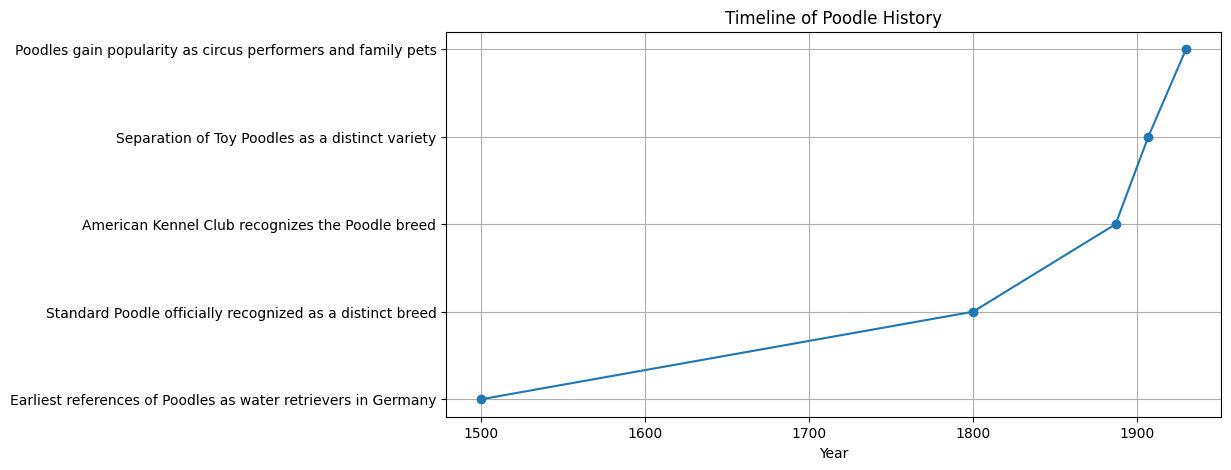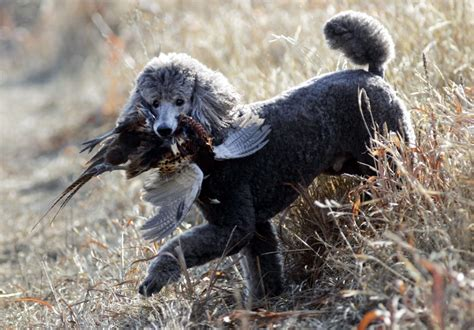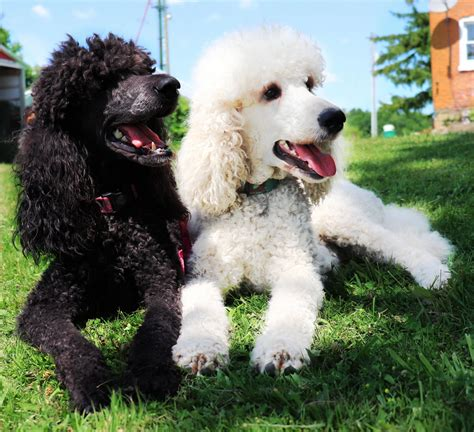Introduction to the Poodle Breed
The poodle is a beloved dog breed known for its intelligence, elegance, and versatile nature. Originating as water retrievers, poodles have evolved into popular companion dogs while retaining their working dog instincts. This article explores the rich history, diverse temperament, and distinctive characteristics of the poodle breed.
The Origins and History of Poodles
Early Beginnings as Water Retrievers
Contrary to popular belief, poodles originated in Germany, not France. The breed's name derives from the German word "pudeln," meaning "to splash in water," reflecting their initial purpose as water retrievers for hunters.
Timeline of Poodle History Milestones
- 1500: Earliest references of poodles as water retrievers in Germany
- 1800: Standard poodle officially recognized as a distinct breed
- 1887: American Kennel Club recognizes the poodle breed
- 1907: Separation of toy poodles as a distinct variety
- 1930: Poodles gain popularity as circus performers and family pets

Evolution from Working Dogs to Companions
Over time, poodles transitioned from their role as hunting dogs to become favored companions of European nobility. Their intelligence and trainability made them popular circus performers, further cementing their status as versatile and talented dogs.
Physical Characteristics and Sizes
Poodle Sizes: Standard, Miniature, and Toy
Poodles come in three officially recognized sizes:
- Standard Poodle: Over 15 inches tall, weighing 40-70 pounds
- Miniature Poodle: 10-15 inches tall, weighing 10-15 pounds
- Toy Poodle: Under 10 inches tall, weighing 4-6 pounds
Some kennel clubs also recognize a medium poodle size, falling between standard and miniature.
Distinctive Coat and Grooming Requirements
Poodles are known for their dense, curly coat that comes in various solid colors. Their hypoallergenic coat requires regular grooming to prevent matting and maintain its distinctive appearance.
Poodle Temperament and Personality Traits
Intelligence and Trainability
Poodles consistently rank among the most intelligent dog breeds. Their high intelligence makes them highly trainable and capable of excelling in various dog sports and activities.
Energy Levels and Exercise Needs
All poodle sizes exhibit high energy levels and require at least an hour of daily exercise. They enjoy activities such as brisk walks, jogging, swimming, and fetch.
Social Nature and Family Compatibility
Poodles are generally friendly, affectionate, and good with children when properly socialized. They form strong bonds with their families and can be protective of their loved ones.

Poodles as Working Dogs
Historical Roles in Hunting and Retrieving
Poodles were originally bred for waterfowl hunting, using their swimming abilities and soft mouths to retrieve downed birds. Their water-resistant coat and athletic build made them excellent water retrievers.
Modern Working Roles
Today, poodles continue to excel in various working roles, including:
- Service dogs
- Therapy dogs
- Search and rescue
- Agility and obedience competitions
Grooming and Care Requirements
Coat Maintenance
Poodles require regular grooming to maintain their coat health and appearance:
- Brush 2-3 times weekly to prevent matting
- Professional grooming every 4-6 weeks
- Regular bathing and nail trimming
Exercise and Mental Stimulation
To keep poodles happy and healthy, provide:
- Daily exercise (at least 60 minutes)
- Mental stimulation through training and puzzle toys
- Opportunities for swimming and water play
Health Considerations for Poodles
Common Health Issues
Poodles may be prone to certain health conditions, including:
- Hip dysplasia
- Progressive retinal atrophy
- Addison's disease
- Bloat (in larger poodles)
Regular veterinary check-ups and genetic testing can help identify and manage these potential health concerns.

Poodles as Family Pets
Suitability for Different Households
Poodles can adapt well to various living situations, from apartments to large homes with yards. Their different sizes make them suitable for families with different space constraints and lifestyle preferences.
Interaction with Children and Other Pets
When properly socialized, poodles generally get along well with children and other pets. However, smaller poodle varieties may be better suited for households with older children who can handle them gently.
Training and Socialization
Early Socialization Importance
Early socialization is crucial for poodles to develop into well-rounded adults. Expose them to various people, animals, and environments from a young age.
Positive Reinforcement Techniques
Poodles respond best to positive reinforcement training methods. Use treats, praise, and play to motivate and reward desired behaviors.
Frequently Asked Questions
-
Are poodles hypoallergenic? Yes, poodles are considered hypoallergenic due to their low-shedding coat.
-
How long do poodles live? Poodles typically live 10-18 years, with smaller varieties tending to have longer lifespans.
-
Are poodles good family dogs? Yes, poodles are generally excellent family dogs when properly trained and socialized.
-
Do poodles require a lot of exercise? Yes, poodles are energetic dogs that require at least an hour of daily exercise.
-
Are poodles easy to train? Yes, poodles are highly intelligent and trainable, making them one of the easiest breeds to train.
Conclusion
The poodle breed offers a unique combination of intelligence, versatility, and charm. From their origins as water retrievers to their current status as beloved companions, poodles have proven themselves adaptable and capable in various roles. Whether you're drawn to their elegant appearance, sharp minds, or affectionate nature, poodles can make excellent pets for the right families willing to meet their exercise, grooming, and mental stimulation needs.
